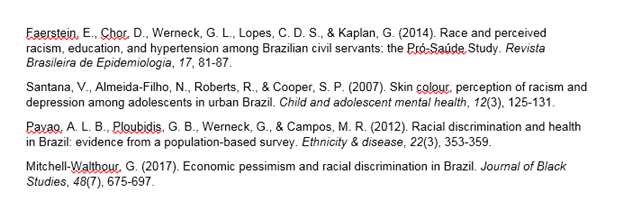In Brazil, employers report the race of their workers in wage reports sent to the government. In 2017, Cornwell and co-authors investigated what happens when workers change jobs. http://jhr.uwpress.org/content/52/3/719.short">https://jhr.uwpress.org/content/5...
Workers labeled as black or mulatto in their previous jobs but that now white, as perceived by their new employers, get a 4% bump in their wages (every other possible explanation is controlled for). If the transition is from white to black or mulatto, wages go down by 4%.
Another article is by Francis-Tan, who studied siblings who differed by the color of their skin. He found that there isn’t an education gap. But what happens when they enter the job market? Racism kicks in. https://www.sciencedirect.com/science/article/abs/pii/S0049089X16000338">https://www.sciencedirect.com/science/a...
Siblings perceived as black/mulatto struggle to find formal employment, and even when they get one, it is of lower quality. Scientific evidences validates Djamila Ribeiro’s argument that, in Brazil, racism is deeply embedded in the country’s social structure.
Racism also shows up on health outcomes. Ana Pavão and co-authors (2012) weights the effects of racial discrimination on three health outcomes: depression, physical disorders and well-being. They’ve interviewed 3.863 people.
Respondents reported previous experience of racial discrimination. Results are grim: any previous experience of racial discrimination results in a 1.37 higher chance of worse health outcomes.
Physical disorders (1.55 times) and depression (1.77) are more likely. Another study is Faerstein et al (2014). They analyzed data for 3.000+ civil servants (of whom, 48% are black or mulatto). They also rely on self-reported racial discrimination (16% reported it).
For those who experienced racial discrimination, high blood pressure is 2.1 times more likely (1.5. for the whole sample of African-Brazilians). Even worse, structural racism (you should check @silviolual book) creates a vicious cycle.
Mitchell-Walthour (2017) estimates the impact of discrimination on economic confidence, based on a Vanderbilt University survey with 1,339 respondents. She regresses well-being perception against racial discrimination, income, education, age, gender and racial identification.
Results are grim: those who perceive racial discrimination have a more pessimist outlook of their own potential. Lower confidence reduces risk-taking, which keeps people trapped in their socio-economic stratum.
Structural racism crushes long-term potential of black and mulatto Brazilians. To add insult to injury, the paper shows that this happens more often with black women of higher education. The message is quite clear: “stay where you belong. Don’t even bother.”
Unfortunately, racism is everywhere. Vilma Santana and co-authors measure racial discrimination fallout on depressed teenagers (10 to 21 y.o) in Salvador (973 respondents). Just like the other papers, they find that
teenagers who went through racial discrimination are way more likely to be depressed. They control for age, gender, social-economic status, self-esteem and skin color – results don’t change.
By now, it should be clear that structural racism results in lower health and economic outcomes for black and mulatto in Brazil. Changing this will take decades, unfortunately. Affirmative action helps. I will write about it later.
For now, here are the references. I searched for others works that could show different results. Couldn’t find anything. Brazil will never develop until it tackles structural racism head on.
@causalinf @erinhengel I think this might interest you. @BrankoMilan, do we have data on inequality related to race?
@silviolual @_pinheira might interest you.
@nomadj1s, might interest you.

 Read on Twitter
Read on Twitter


